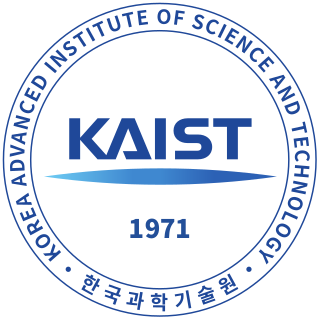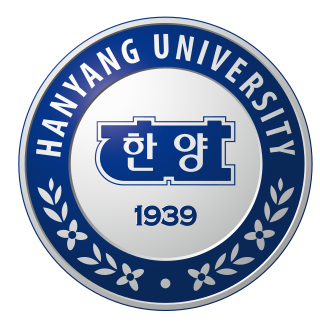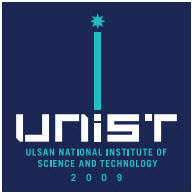
The Korea Advanced Institute of Science and Technology (KAIST) is a national research university located in Daedeok Innopolis, Daejeon, South Korea. KAIST was established by the Korean government in 1971 as the nation's first public, research-oriented science and engineering institution. KAIST is considered to be one of the most prestigious universities in the nation. KAIST has been internationally accredited in business education, and hosts the Secretariat of the Association of Asia-Pacific Business Schools (AAPBS). KAIST has 10,504 full-time students and 1,342 faculty researchers and had a total budget of US$765 million in 2013, of which US$459 million was from research contracts.

Seoul National University is a public research university located in Seoul, South Korea. It is one of the SKY universities and a part of the Flagship Korean National Universities.

Kyungpook National University is one of ten Flagship Korean National Universities representing Gyeongbuk Province in South Korea. With its main campu situated in Daegu, the former capital city of the Gyeongbuk Province, South Korea, KNU serves as a hub for academic excellence and innovation in the region.
Ajou University is a private research university located in Suwon, Gyeonggi Province, South Korea. It was founded in 1973 by Park Changwon.
Chungnam National University is one of ten Flagship Korean National Universities located in Daejeon, South Korea.

Pohang University of Science and Technology (POSTECH) is a private research university in Pohang, South Korea.

The Catholic University of Korea (Korean: 가톨릭대학교) is a private Roman Catholic university in Bucheon-si, Gyeonggi-do, South Korea. It was established in 1855. The Catholic University of Korea operates campuses in Seoul and in the neighboring Bucheon City. The university's school of medicine operates eight affiliated hospitals throughout the country.

Chonnam National University is one of ten Flagship Korean National Universities located in Gwangju and South Jeolla Province, South Korea. In March 2006, Yeosu National University merged with Chonnam National University to become a satellite campus. CNU ranked the 10th nationwide and the 420th worldwide in world university rankings in the CWUR. It was also the 1st among the nine Korean national flagship universities in "Asia’s Top 75 Most Innovative Universities" in 2017 Reuters. CNU has also expanded its global reach by establishing partnerships with 499 Universities in 62 countries as of 2019.

Hallym University (한림대학교) is a private university located in Chuncheon, Gangwon, Republic of Korea. Hallym University was established in 1982. In 1995 it was designated by the Ministry of Education as one of a handful of universities entitled to receive the financial support of the Ministry for their specialization programs. After that, it continued to be so designated consecutively for five years. In addition, it has acquired the status of "distinguished university," the title granted by the Ministry of Education, three years in a row, and has also been selected for funding by the Brain Korea 21 Project.

Korea University is a private university in Seoul, South Korea. Established in 1905, the university was named after Goguryeo. The university is one of the SKY universities.

Hanyang University is a private prestigious research university in Seoul and Ansan, South Korea. Hanyang derives from the former name of the capital Seoul used during the Joseon Dynasty. The university was founded in 1939 as an engineering school, and was the country's first college to offer engineering and architecture programs.

Inha University is a private research university located in Incheon, South Korea. Known traditionally for research and education in the engineering and physical sciences, the university was established by the first president of South Korea, Syngman Rhee. Inha is a Korean-American collaboration school, even in its name: the Morpheme "In" comes from the city of Incheon and "Ha" from Hawaii, USA. Started as a polytechnic university in 1954, named Inha Institute of Technology, the institute has been achieving national recognition and a strong reputation as a technological research university thereafter.

Kookmin University is a private research university established in 1946 in Seongbuk-gu, Seoul, South Korea. It has historic significance, as it was founded during by the Provisional Government of the Republic of Korea and is the first private university founded after the liberation of the Republic of Korea from Japan.

Konkuk University is a South Korean private university founded in 1931 and it is one of the top universities in South Korea. The university was founded based on three virtues: sincerity, fidelity, and righteousness.
Jeonbuk National University is one of ten Flagship Korean National Universities founded in 1947, located in Jeonju, South Korea. Jeonbuk National University has been ranked 551–560th in the world by QS Top Universities Ranking in 2023.

The University of Ulsan (Korean: 울산대학교) (UOU) is a private university in Nam-gu, Ulsan, South Korea. It was founded on February 19, 1969 as the Ulsan Institute of Technology. The University was expanded into a four-year university on March 1, 1985. The University currently has approximately 10,500 students enrolled.

Sejong University is a private university located in Seoul, South Korea known for its standing in hospitality and tourism management, dancing, animation and rhythmic gymnastics. Founded as the Kyung Sung Humanities Institute, it was renamed in 1978 to its present name in honor of Sejong the Great, the fourth king of the Joseon Dynasty and overseer of the creation of the Korean alphabet Hangul.

Seoul National University of Science and Technology is a national university located in Nowon-gu, Seoul, South Korea.

Ulsan National Institute of Science and Technology, is one of the four public universities in South Korea which are dedicated to research in science and technology, along with KAIST, GIST, and DGIST. UNIST was founded in 2007 in response to growing demand for higher education in the Korean industrial capital of Ulsan, where world-renowned automotive, shipbuilding, petrochemical, and secondary cells industries are clustered. At the time of its foundation, UNIST was known for being the first national university in South Korea to be incorporated and thus administered by an independent board of trustees despite being funded by the central government.

Daegu Gyeongbuk Institute of Science and Technology is a public science and engineering university located on Daegu Technopolis, Daegu, South Korea. DGIST is one of the four public universities in South Korea dedicated to research in science and technology, along with KAIST, GIST, UST, and UNIST. Under the Special Act on Support of Scientists and Engineers for Strengthening National Science and Technology Competitiveness, the Korean government enacted the Daegu Gyeongbuk Institute of Science and Technology Act and founded DGIST in 2004 as a research institute. In 2008, the act was amended to extend the role of the institute to both research and education, which eventually enabled a transition from research institute to university for DGIST.

















